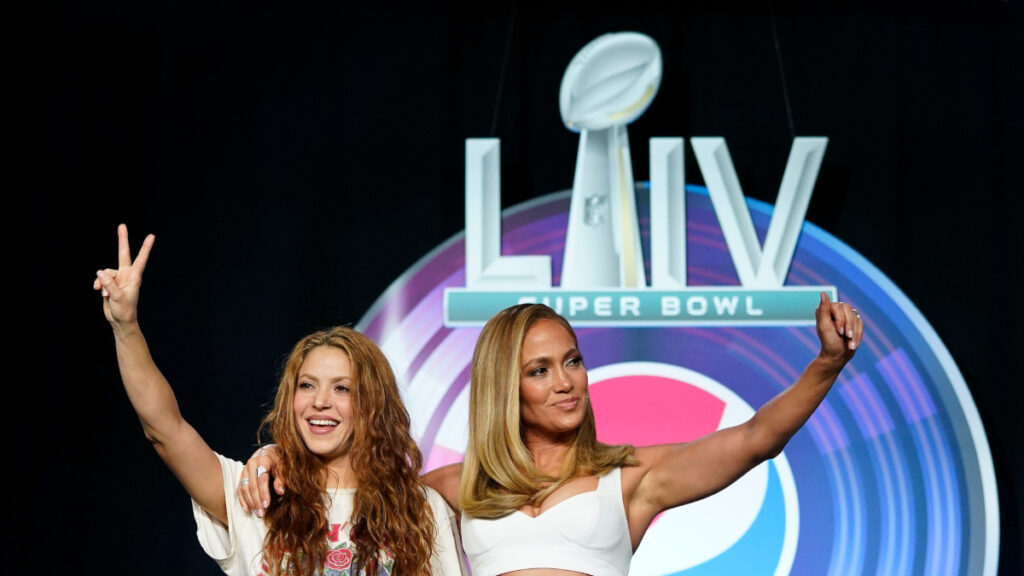Last updated on July 7th, 2021 at 03:12 pm
The halftime show at Sunday’s Super Bowl LIV seems to have sparked more discussion in the news over the past two days than the big game itself. The spectacle, featuring singers Shakira and Jennifer Lopez, met with varied reactions online and in the media.
One writer at Yahoo! Finance, Alexandra Canal, wrote that the show — for the first time headlined by two Latina women — marked “an important turning point for the NFL as the league looks to become a more culturally inclusive organization.” But Canal notes without comment one major reason the show, whatever its “inclusivity,” has been criticized in many quarters, writing that the ” performance… included everything from a stripper pole to a children’s choir.” Canal doesn’t seem to have realized, of at least doesn’t think it’s worth mentioning, that these two things don’t usually go together in the ordinary American’s mind.
Canal isn’t alone in missing that point, however. There were even some criticisms of the halftime show that also sidestepped this obvious problem. Take, for example, a commentary piece in the Washington Post by an American Studies Professor at Wellesley College, Petra Rivera-Rideau. Petra Rivera-Rideau criticized the show for the opposite reason Canal praised it, alleging it was not inclusive enough: “[W]hile their performance at moments expressed Latino pride, Shakira and Lopez missed an important opportunity to ally themselves with black communities, including Afro-Latino ones .”
Rivera-Rideau mentions only as a casual aside “discussion of the show’s sexuality” which, she says, “are deeply rooted stereotypes of Latinas as hypersexual…, stereotypes that fuel xenophobic rhetoric and policies.” Rivera-Rideau alleges that “[i]t was this rhetoric that J-Lo and Shakira sought to address in their performance,” but it’s difficult to see how a show incorporating a “stripper pole” advanced that goal in any helpful way.
And then, of course, there is PETA, which attacked J-Lo for wearing a cape made of feathers while making no mention of the harm to human dignity that might be construed from a performance involving sexual gyrations and a stripper pole on the very day that marks one of the the highest incidence rates of human sex trafficking each year.
Fortunately, at least some sane commentary on the whole affair has been penned in the days since.
Kyle Smith at National Review called attention to the Emperor’s (or performers’) lack of clothes in a piece entitled, “J. Lo’s Stripper Routine Was Not ‘Empowering’.” Smith writes:
To me, an excellent test for whether something is “empowering” for women is the following question: Is this the best you can picture for your daughter? Daughter as astronaut, daughter as president, daughter as physicist: empowering. Daughter as stripper: not so empowering.
In a response piece, also at NRO, Alexandra Desanctis calls attention to another major lacuna in the discussion over the show by the mainstream media (which mostly consists of breathless praise). Desanctis asks the obvious question: “What about all the kids who must have been watching?”
Desanctis writes that when she posed this question on Twitter, people responded, “Can’t the kids just leave the room?” But this is precisely the kind of “missing the point” that has been evidenced above, and Desanctis strikes back at it:
Perhaps they shouldn’t have to.
Perhaps parents of young girls shouldn’t have to worry about their daughters catching a glimpse of a grown woman pretending to be a stripper, leading to questions about her own body image and her own dignity. Perhaps parents of young boys shouldn’t have to worry about their sons curiously watching barely clothed dancers performing overtly sexualized dances when they’re just trying to watch their favorite athletes. Perhaps parents should be able to leave the room themselves without wondering what kind of inappropriate content might appear onscreen during one of the most televised moments of the year.
It seems like stating the obvious, of course; but as the discussion in progress in so many other quarters has revealed over the past couple of days, apparently the obvious isn’t so obvious anymore.
